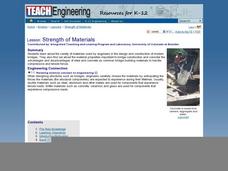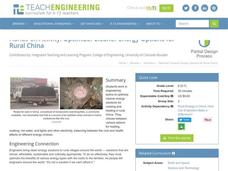Teach Engineering
Load It Up!
See how a marshmallow can hold up a bridge load. Teams take a closer look at the design of bridge piers. They determine the types of loads that might affect a bridge, and, using that information, they calculate the needed cross-sectional...
Teach Engineering
How Antibiotics Work
Take two pills and call me in the morning. The first lesson in a short unit of four introduces class members to delivery methods of medicines. The instruction introduces the question of which delivery method is best to get you feeling...
Teach Engineering
What Makes Our Bones Strong?
So is that what you meant by rubber legs? The activity has pairs subject a chicken bone to vinegar and observe what happens over a period of days. Individuals then write up a lab report and document their observations and findings.
Teach Engineering
Solar Angles and Tracking Systems
The sun will continue to rise in the east and set in the west, no matter what. The first lesson in a series of eight introduces the class to solar angles. It makes connections between a person's latitude and the angle of position of the...
Teach Engineering
Bend That Bar
Bend it, but don't break it. Groups investigate the strength of different materials. Using a procedure in the seventh segment of a 22-part series on aviation, pupils determine how far a rod will bend. They determine the strength-to-mass...
Teach Engineering
Better By Design
Which modification is the best? Using the scientific method, pairs determine the effects of each control surface on the distance of a glider's flight. The activity, section 16 in a 22-part unit on aviation, allows pupils to gain a better...
Teach Engineering
May the Force Be With You: Lift
Get the class up and going with a lesson that discusses how airplane wings provide lift. Pupils use their knowledge of Bernoulli's Principle to develop an explanation of how it creates lift on airplane wings.
Teach Engineering
Windy Tunnel
Lift—it is about the wing's attack. Using a virtual wind tunnel, pupils investigate wing shape and angle of attack. Learners use worksheets to record their observations and to convert verbal relationships into mathematical equations in...
Teach Engineering
Strength of Materials
Pupils examine a stress-strain diagram that compares the advantages and disadvantages of the two common bridge building materials, concrete and steel. The also consider the factors that influence the materials builders choose for their...
Teach Engineering
The Cloning of Cells
Did you know that there are over 200 different types of cells in the human body? One type, the stem cell, is the focus of the fifth of six installments in the Cells unit. The lesson plan asks the class to discuss stem cells and their...
Teach Engineering
Optimize! Cleaner Energy Options for Rural China
What are the trade-offs when looking to get the most benefit from an energy source? Small groups compare the cost-to-emission levels of several energy sources by looking at the information graphically. The groups utilize this information...
Teach Engineering
Gumdrop Atoms
There's nothing sticky about the resource, unless you count the gumdrops! Scholars create a model of a lithium atom, complete with protons, neutrons, and electrons. It's just that these models are made with gumdrops and toothpicks.
Teach Engineering
Trash to Treasure!
One person's trash is another man's treasure. Challenge your class to build something useful out of the trash they throw away on a regular basis. Groups design and build a practical item from trash they collect, allowing the class to...
Teach Engineering
Show Me the Money
Class members learn how to estimate the total costs involved to design and build a bridge by including design, material, equipment, and labor costs. The activity includes a discussion about the trade-off between cost and aesthetics.
Teach Engineering
Live Like an Animal
When your parents say that your room's a pig sty, tell them about biomimicry. The sixth installment of a nine-part Life Science unit has scholars research the shelters used by animals in the natural world, like turtle shells. Using the...
Teach Engineering
Maximum Mentos Fountain
A messy fountain is potentially an energy experiment in disguise. Groups investigate the variables in creating a fountain from soda and Mentos. The last activity in a six-part series on energy has the class observe the fountain in terms...
Teach Engineering
Airplane Tails and Wings: Are You in Control?
Keep everything under control. The lesson, the 16th segment in a 22-part unit, provides a more detailed look at the parts of a plane, specifically the control surfaces. Pupils learn about the construction of the wings and the tails and...
Teach Engineering
Fun with Bernoulli
Reduce the pressure in the classroom. The second instructional activity in an Airplanes unit of 22 introduces the class to Bernoulli's Principle. Pupils demonstrate the principle by blowing between different objects causing a reduction...
Teach Engineering
May the Force Be With You: Drag
Do not let friction drag you down! The 11th segment in a series of 22 focuses on the fourth force acting upon an airplane—drag. Pupils learn about the effects and causes of drag.
Teach Engineering
Egg-cellent Landing
The classic egg-drop experiment gets a new bounce with an activity that asks pairs to design a lander similar to one used to land a rover on Mars within a fixed budget. The activity provides a great introduction to the idea of terminal...
Teach Engineering
Equal and Opposite Thrust in Aircraft: You're a Pushover!
It's the law—every action requires a reaction, no matter how small. Pupils experience two demonstrations of Newton's third law of motion as it relates to thrust in the 10th segment of a 22-part unit on flight. Using their mathematical...
Teach Engineering
Household Energy Conservation and Efficiency
Are your household devices eating up a lot of energy? Pupils investigate household energy efficiency through a set of activities. They find ways to improve energy efficiency and reduce consumption. This is the 21st installment of a...
Teach Engineering
Understanding Elements
Nothing says organization quite like a table. The third lesson in a six-part Mixtures and Solutions unit teaches young scientists about elements and the periodic table. They learn how the periodic table is organized and about the...
Teach Engineering
Global Climate Change
The greenhouse effect and its relationship to global warming is the focus of an activity that asks class member to consider the effects of climate change on weather. Pupils work with their families to determine their carbon footprints...

























